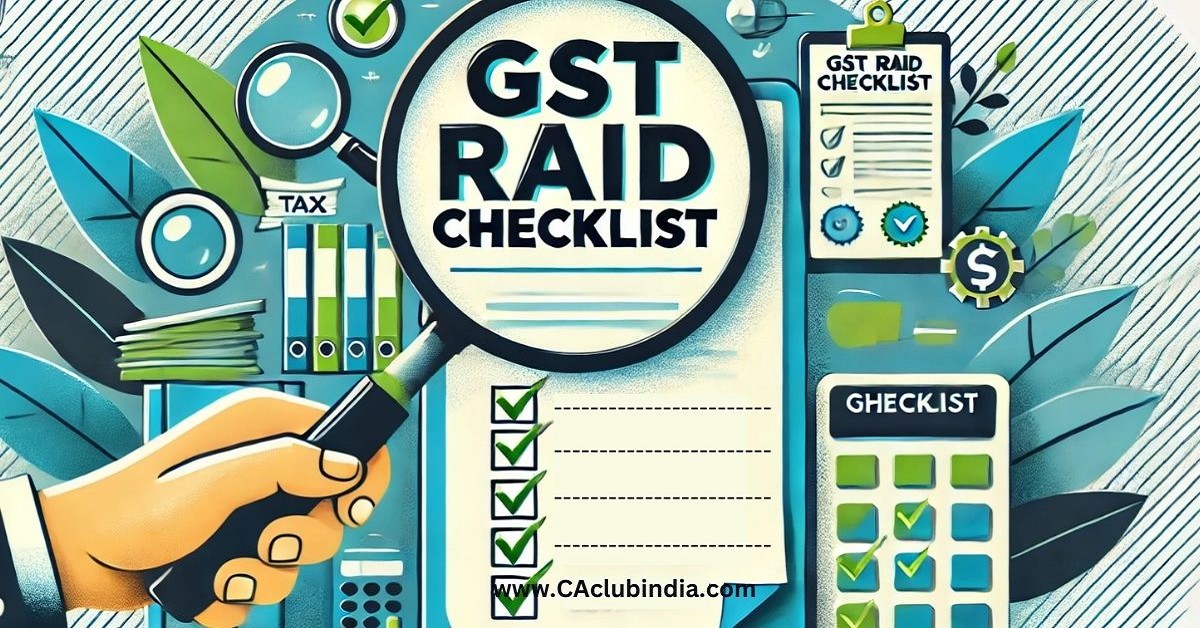A GST (Goods and Services Tax) raid is a critical enforcement action taken by tax authorities when they suspect tax evasion, non-compliance, or fraudulent activity related to GST. These raids can have significant implications for businesses, affecting their operations, reputation, and finances.
Below is a checklist of key points to help businesses prepare for a potential GST raid and an overview of its impacts:

Checklist for GST Raid Preparation
Document Organization
- Ensure all GST-related records are well-organized, including sales invoices, purchase invoices, e-way bills, input tax credit (ITC) records, and tax returns.
- Maintain at least five years of data as per the GST Act’s requirement for record retention.
IT and Digital Data Backup
- Ensure proper backup of digital records, accounting software, and data stored on computers or cloud storage. Tax authorities can access electronic records during a raid.
Employee Awareness and Training
- Train key employees on how to handle interactions with tax officers.
- Designate a specific team or representative who can engage with GST officers during a raid.
Compliance with GST Returns
- File GST returns on time, including GSTR-1, GSTR-3B, and annual returns (GSTR-9).
- Ensure accuracy in declared turnover, ITC claims, and other entries to avoid discrepancies.
E-Way Bill Compliance
- Maintain records of all e-way bills, especially for inter-state movements of goods.
- Verify that the e-way bills match the goods transported to avoid suspicion of tax evasion.
Invoice Matching and ITC Reconciliation
- Regularly reconcile input tax credit with GSTR-2A or GSTR-2B to match the credits claimed with supplier data.
- Ensure no fake invoices are used for claiming ITC, as this is a common area of scrutiny.
Tax Payments and Bank Statements
- Keep proof of all GST payments made to the government.
- Be ready to provide bank statements to show financial transactions if required by officers.
Legal Support and Consultant Access
- Have a GST consultant or lawyer on standby in case of a raid.
- Keep key compliance documentation accessible and ensure proper understanding of tax laws.
Impacts of GST Raids on Businesses
Financial Penalties and Interest
- Heavy fines and interest charges can apply if tax evasion is detected.
- Penalties can range from a percentage of the evaded tax to 100% or more, depending on the severity.
Reputation Damage
- GST raids can impact a business's reputation among customers, suppliers, and investors.
- In industries where trust is critical, reputational damage can lead to loss of business.
Operational Disruption
- Raids may disrupt normal operations, affecting production, delivery timelines, and customer service.
- Authorities may seal premises or confiscate records, which can hamper day-to-day functioning.
Loss of ITC and Cash Flow Issues
- If fake invoices or mismatched invoices are identified, businesses may lose ITC claims, impacting cash flow.
- Cash flow can further be affected by penalties, interest, and any immediate tax dues.
Legal Proceedings and Criminal Charges
- In severe cases, GST raids may lead to criminal proceedings if fraud or willful evasion is proven.
- Directors or responsible officers of a business could face imprisonment or other legal
consequences.
Heightened Scrutiny and Audit Risks
- Post-raid, the business may face increased scrutiny from GST authorities, leading to regular audits and checks.
- Increased compliance requirements can mean more administrative and legal costs.
Post-Raid Actions for Businesses
Compliance Rectification
Address any issues found during the raid by correcting documentation or paying outstanding taxes, penalties, or interest.
Implement Stronger Internal Controls
Adopt more rigorous internal controls to prevent discrepancies and improve future compliance.
Regular Compliance Audits
Conduct regular internal audits to ensure GST compliance, avoid future risks, and improve preparedness.
GST raids can have significant financial and reputational impacts, so businesses need to ensure strong compliance, keep records organized, and work with a qualified GST consultant to handle complex tax matters.











 CAclubindia
CAclubindia
